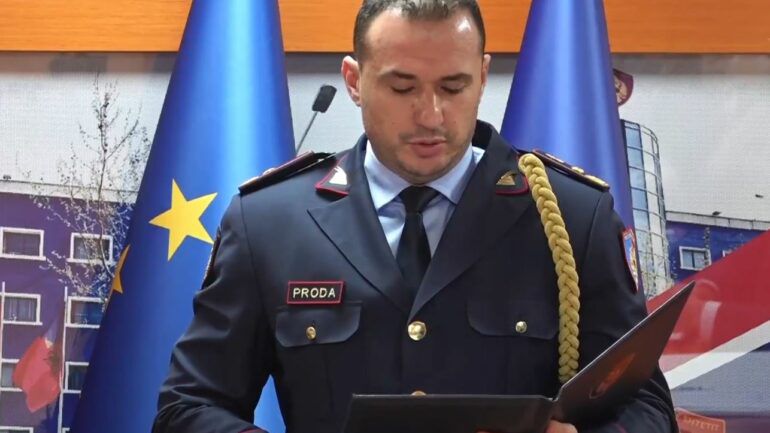
TIRANA, Albania – The recent appointment of Ilir Proda as General Director of the State Police has ignited a wave of controversy in Albania, with accusations of improper influence from criminal groups and concerns over the transparency of the selection process. Adding to the uncertainty, unverified reports suggest that Proda’s phone has been seized by Albania’s Special Anti-Corruption Structure (SPAK), fueling speculation about his involvement in compromising a police operation in favor of organized crime.
However, as of this writing, SPAK has made no official statement regarding the alleged seizure, leaving the public and media grappling with a mix of concerns, unconfirmed reports, and unanswered questions.
Accusations of Criminal Influence
The controversy began when investigative journalist Klodiana Lala, a guest on the TV program “Të Paekspozuarit” on MCN TV, made striking claims regarding Proda’s appointment. Lala alleged that the selection process was influenced by criminal groups in the port city of Durrës. According to Lala, the competition for the position was “fictitious” and driven by “organized crime interests.” She pointed specifically to the involvement of Durrës-based criminal factions, expressing concern that the process was far from transparent.
“This was a predetermined race, influenced by organized crime,” Lala said during her television appearance. “If Ilir Proda receives the government’s vote of confidence, I hope he proves otherwise—that he is not under the influence of organized crime.”
These comments have amplified existing concerns about the integrity of Albania’s institutions and the shadowy role that criminal organizations allegedly play in high-level appointments. Lala pointed out that there had been little public disclosure throughout the selection process. “We didn’t see the candidates’ CVs, we didn’t see their strategies, and there was no public interview process to assess their competencies,” she added.
While Proda has yet to respond to the allegations, Lala emphasized that her critique was primarily aimed at the lack of transparency. “I don’t want to prejudge Mr. Proda,” she said, “but the fact that the process has been so opaque raises serious questions.”
Rumors of Phone Seizure by SPAK
The controversy has been further complicated by reports that SPAK, the independent anti-corruption and organized crime investigative body in Albania, may have seized Proda’s phone as part of an ongoing investigation. Proda is rumored to be under scrutiny for allegedly compromising a police operation in favor of certain criminal groups.
As of yet, SPAK has neither confirmed nor denied these reports. The absence of any official statement has left the media and the public in a state of uncertainty, with no clear answers regarding the validity of the claims. In such a sensitive case, SPAK’s silence adds to the air of mystery surrounding the allegations.
While it is not uncommon for high-level officials to be investigated in Albania, the lack of official information from SPAK underscores the fine line journalists must walk when reporting on such matters. Without confirmation, these reports remain speculative, raising ethical concerns about how to handle unverified information.
Calls for Greater Transparency
The alleged seizure of Proda’s phone, combined with Lala’s accusations, has intensified calls for greater transparency in Albania’s political and legal processes. The public’s trust in the justice system and state institutions is fragile, and cases like this only deepen skepticism.
Critics argue that the opacity surrounding Proda’s selection is emblematic of a broader problem within Albania’s government—namely, that too many critical decisions happen behind closed doors. If the country’s leadership wishes to strengthen its institutions and bolster public confidence, they argue, it must open up the selection processes for key positions, like that of General Director of the State Police, to public scrutiny.
In the meantime, Proda’s future remains uncertain. Despite the accusations and rumors, he is still expected to receive a vote of confidence from the government. Whether he can prove his independence from organized crime and navigate the cloud of controversy surrounding his appointment remains to be seen.
The Broader Context: Organized Crime in Albania
Albania has long struggled with the influence of organized crime, particularly in key regions like Durrës, which is a major hub for both legal and illegal activities. Criminal organizations in the country have historically maintained close ties with political figures, creating a challenging environment for law enforcement to operate independently.
The appointment of Ilir Proda to head the State Police comes at a critical juncture, as international actors, including the European Union, continue to push Albania to crack down on corruption and criminal influence as part of its efforts to join the EU. The allegations surrounding Proda’s appointment, coupled with the rumored SPAK investigation, place added pressure on the government to demonstrate its commitment to these reforms.
Awaiting Clarity
As the controversy surrounding Ilir Proda’s appointment unfolds, one thing is clear: Albania’s political and institutional transparency is once again in the spotlight. Until SPAK makes an official statement or more information is revealed, the country is left in a state of limbo. In the meantime, the public, media, and international observers will continue to watch closely, awaiting clarity on whether the accusations against Proda hold weight or are simply part of Albania’s often turbulent political landscape.
For now, the question remains: Will Ilir Proda emerge from this cloud of uncertainty with his integrity intact, or will this controversy mark the beginning of a deeper investigation into criminal influence in Albania’s institutions.
